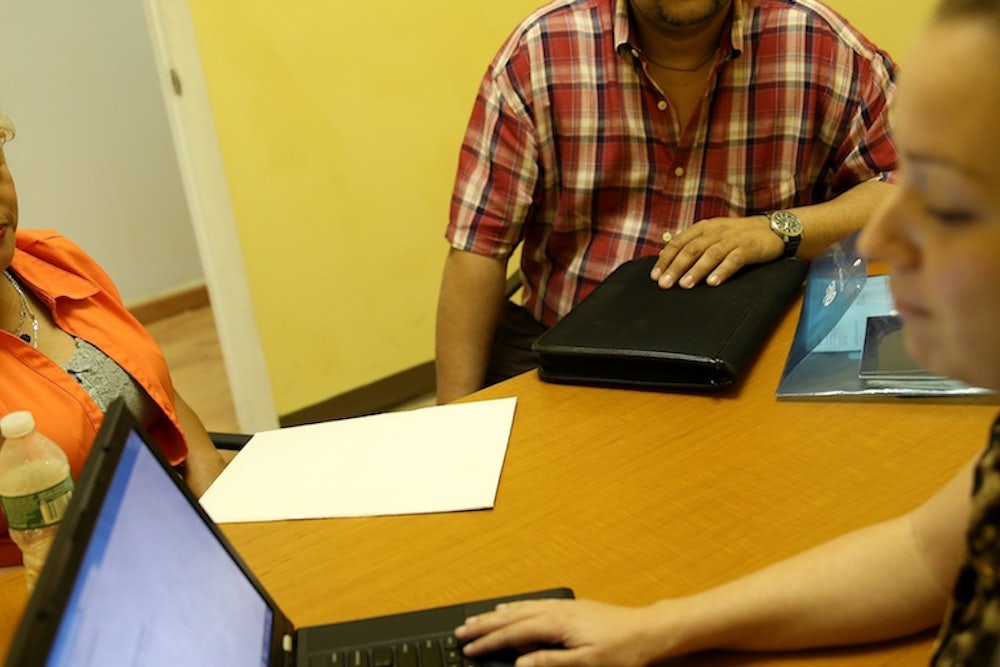The percentage of Americans without health insurance may be falling, according to a new survey. And it may be because of Obamacare. But, at this point, nobody really knows for sure.
The tantalizing, but very ambiguous, sign of Obamacare progress comes from Gallup, which regularly asks people about their health insurance status. On Thursday morning, Gallup published the results from polling of 9,000 adults between January 2 and January 19—in other words, right after the rush of enrollments in December. And the news certainly looks good upon first inspection. According to the survey, 16.1 percent of Americans don't have health insurance. That’s down from 17.3 percent in December and a peak of 18.6 percent earlier in the year. The sharpest drops are among non-whites and the unemployed. This is exactly what we would expect for the initial stages of a program that offers Medicaid or highly subsidized private insurance to lower-income Americans.
Hooray! But wait—upon closer inspection, the data turns out to be pretty murky. One reason the uninsurance rate dropped so sharply is that, according to Gallup, it rose substantially during the first part of 2013. In other words, for the first few months of the year, large numbers of people were losing their insurance. There’s no obvious reason why that would have happened. At that time, the economy was growing, albeit slowly, while unemployment was declining. And the shift happened way too early to be the effect of those infamous plan cancellations. Notices about those didn’t go out until the fall.
That unexplained volatility makes it difficult to put much stock in the results. In other words, you shouldn't read too much into these figures—or, for that matter, any figures you are hearing these days.
On Wednesday, for example, the Department of Health and Human Services released updated statistics on Medicaid enrollment. More than 6.3 million people have signed up for the program since October, either through Obamacare marketplace websites or directly through state agencies. That’s a big number. But it comes with a big asterisk. Some people signing up for Medicaid had it already—or would have had it anyway, even without the new health care law.
Exactly how many people fall into these categories has been the subject of great debate. Sean Trende, of RealClearPolitics, has done extensive calculations and warned that the net impact of the Medicaid expansion is a lot smaller than it seems. His specific calculations may be a little pessimistic, but the gist of his argument is almost surely right. In fact, the guessing these days (at least among people I consult) is that somewhere between a third and a half of Medicaid enrollments represent people who would have been uninsured without the Affordable Care Act.
Of course, the Medicaid data itself is confusing and incomplete, for reasons Sarah Kliff lays out at Wonkblog. (Among other things, states collect and report information in different ways.) And while the current Medicaid numbers would suggest enrollment is well below what the Congressional Budget Office projected for 2014, slow enrollment is pretty typical of these programs. The Children’s Health Insurance Program had less than a million people in it after year one. Within a few years, its ranks had nearly quadrupled. Don't forget: People can sign up for Medicaid all year. There's no open enrollment window, as there is for private coverage, and it's still only January.
So what’s a reasonable person to think? One fair reading of the data is that it’s consistent with a program that got off to a slow start, because of website problems, but is functioning now—a program that will significantly reduce the number of people without health insurance, but perhaps by a smaller margin than original projections suggested, at least in the first year. But all of that is still conjecture, particularly at this early point in the year. Optimists can make a case that enrollment will reach or come close to projections; pessimists can make a case that enrollment will fall way short. Both can point to real data. (And for those who want to follow the raw data in close to real time, I highly recommend ACAsignups.net, which appears to be very accurate.)
The one thing we can say with confidence is that, since 2011, a few million young adults have been getting coverage because Obamacare let them stay on their parents' policies. But that's because we have more definitive data from sources like the Census Bureau. We won't have similar information about the effects of the Medicaid expansion or the law's subsidized private coverage for months. And we won't have data on more detailed and ultimately more important questions—like whether people are getting better access to care or gaining financial security—for some time after that. That’s frustrating, but that’s also reality.
